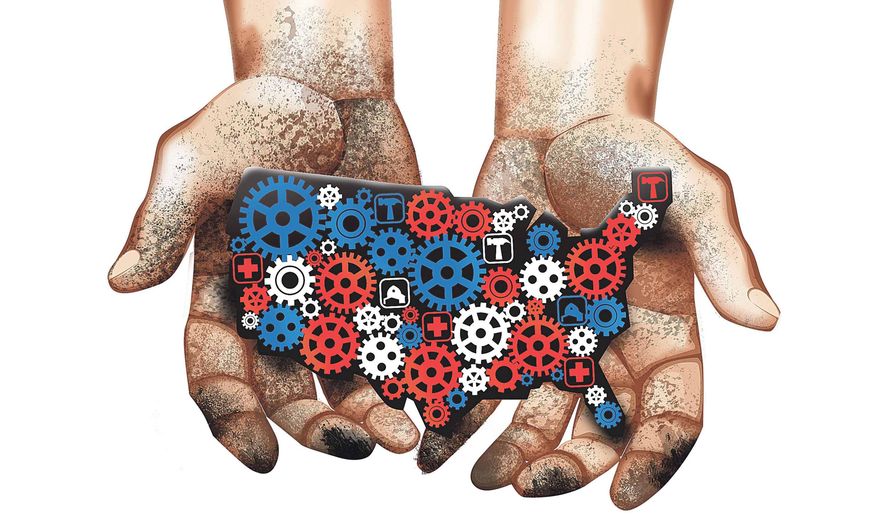OPINION:
No American holiday is as unusual as Labor Day. As legal holidays go, Labor Day isn’t very old. Whereas Washington’s Birthday (now Presidents Day), Independence Day, Thanksgiving and even Memorial Day (originally Decoration Day) go way back in history, Labor Day didn’t become a national holiday until 1895.
Another unusual aspect of Labor Day is that, for most Americans, it has acquired a meaning beyond that of an ordinary holiday. The first Monday in September has become the quasi-official end of summer and the beginning of fall. Before the 1890s, summer came to an end when the weather changed — sometimes as late as mid-October or even early November. Now most warm-weather institutions — community swimming pools, for example — end their season on Labor Day, no matter that the best summer weather may still be ahead. The day after Labor Day also used to signal the first day of the school year. Now many states open school doors in August.
The major proponent of Labor Day was Peter J. McGuire, whose name is not a household word, even in the homes of historians. The son of Irish immigrants, McGuire found his niche as a carpenter and became a leading force behind the trade’s unionization. It was a modest beginning on Aug. 8, 1881, when 36 delegates representing carpenters in 11 states came together to form the United Brotherhood of Carpenters. With McGuire as the principal administrator, the organization grew from a few members to 70,000 strong by century’s end.
McGuire felt that the cause of unionism could be advanced by setting up a special day for all workers, most likely to break up the long holiday-barren period from July 4 to Thanksgiving. The day would not only provide a time of leisure for the worker, but also permit unions to add to their numbers and image through parades and similar demonstrations. McGuire’s idea was supported by the UBC, which was successful in organizing the first Labor Day in New York City on Tuesday, Sept. 5, 1882.
In 1887, Oregon made Labor Day the first Saturday in June. Baltimore celebrated its first Labor Day on Monday, Sept. 2, 1889, along with Boston, Philadelphia, Pittsburgh, Chicago, Detroit, Cincinnati and Kansas City. Southern cities were conspicuous non-celebrators. It was obvious that only a national holiday would serve the interests of McGuire and his followers.
In still another unusual aspect of the holiday’s origins, a national Labor Day was put on the back burner until an unanticipated collapse in the economy occurred in 1893, igniting a bitter railway strike in Pullman, Ill. There, the head of the Pullman Palace Car Co. had built a model town for his employees in 1880. Indeed, George M. Pullman’s town drew the praise of city planners throughout the nation and was especially appreciated by the workers’ wives and children, who were provided with first-rate housing and recreational facilities.
When the downturn came, though, Pullman cut wages, although rents were maintained at their current level. After lengthy negotiations, the workers, assisted by the American Railway Union and its leader, Eugene V. Debs, walked off their jobs in May 1894. A month later, the union effected a boycott of Pullman cars on all American trains. The railroads fought back by firing union members, and the strike spread to trains across 27 states. The federal government ultimately dispatched troops, and Debs was convicted of violating an injunction issued by the attorney general, spending six months in jail in 1895.
While the Pullman strike still raged and public concerns about additional labor strife emerged, legislation establishing a national Labor Day was rushed through both houses of Congress — with unanimous votes — and signed by President Grover Cleveland, with the immediate beneficiaries the large number of workers who preferred an obvious benefit (a day off) to a principle (unionism).
In another unusual twist, neither McGuire nor Debs would serve as rallying leaders for workers on subsequent Labor Days: McGuire’s ideas for a loose federation of unions within the United Brotherhood of Carpenters clashed with the rank and file, and in 1901, he was ousted on what was generally thought to be trumped-up charges of embezzling union funds. Debs, a Socialist Party candidate for president in five elections, spent additional time in jail for having violated the Espionage Act during World War I.
Finally, union leaders in the years after the first national Labor Day were unsuccessful in making the holiday their special day. For it was “labor” day, not a “union” day, the monopoly of no single group. The farmer labored, as did the merchant, physician, lawyer and clerk. There would always be far more of these sorts than there would be workers carrying union cards.
Thomas V. DiBacco is professor emeritus at American University.




Please read our comment policy before commenting.